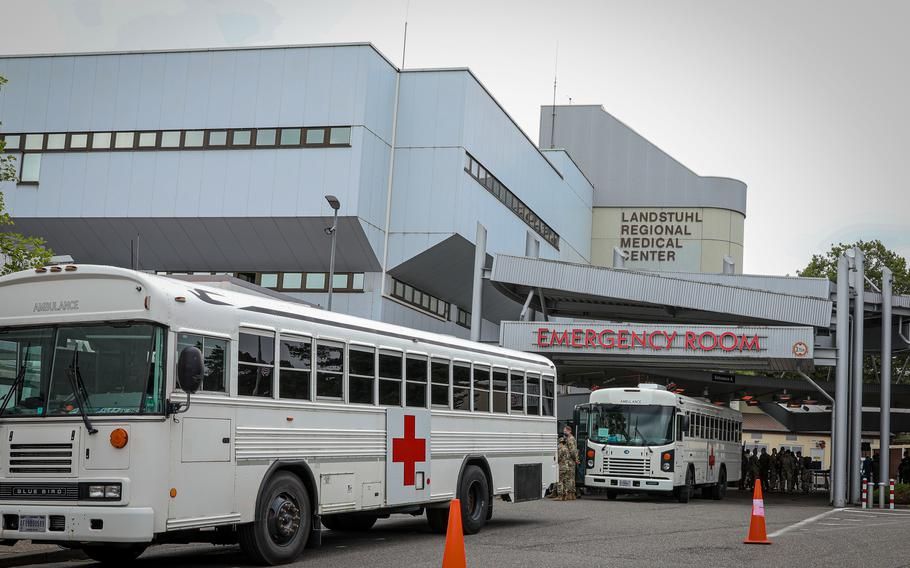Support Beyond Borders: U.S. Army Hospital in Germany Provides Aid to Wounded Americans in Ukraine
In a profound deviation from standard procedures and a subtle step towards deepening involvement in the Ukrainian conflict, the U.S. Army's Landstuhl Regional Medical Center in Germany has commenced admitting wounded Ukrainian Army soldiers, primarily comprising American volunteers. The move marks a significant, albeit quiet, transformation in

In a profound deviation from standard procedures and a subtle step towards deepening involvement in the Ukrainian conflict, the U.S. Army's Landstuhl Regional Medical Center in Germany has commenced admitting wounded Ukrainian Army soldiers, primarily comprising American volunteers.
The move marks a significant, albeit quiet, transformation in the stance of the United States, expanding the realms of its engagement in the protracted war in Ukraine. As the warfare intensifies, Landstuhl stands as a beacon of hope, serving American and other fighters evacuated from the brutal battlefields of Ukraine, providing a semblance of solace in the grueling conflict.
Deepening Ties:
Since the ignition of the war in 2022, Americans, many seasoned military veterans, have been rushing to Ukraine's aid, either voluntarily aligning with local militias or contracting with the Ukrainian national army. The administration, however, had expressly discouraged any American involvement in Ukraine, pledging non-deployment of American troops on Ukrainian soil.
This restraint seems to be diluting, with the U.S. now extending medical aid to those it initially warned to steer clear from the conflict. The subtle shift illustrates the complex, evolving dynamics between the United States, Ukraine, and the shadow of adversaries, primarily Russia.
Quiet Rehabilitation:
Landstuhl, the largest American military hospital outside the U.S., has been a pivotal medical center for American troops evacuated from Iraq and Afghanistan. With the wars subsiding, Landstuhl found its extensive facilities and profound expertise often underutilized. But today, it emerges as a sanctuary for the wounded from Ukraine, most of whom are American citizens.
The wounded soldiers, who have previously relied on a motley of Ukrainian hospitals and Western charities, now have the Pentagon extending the same care afforded to active-duty American troops. Landstuhl, under a Defense Department policy, is permitted to treat up to 18 wounded members of the Ukrainian forces at a given time.
A Risky Benevolence:
While the treatment of wounded soldiers at Landstuhl provides immediate relief and premier medical care to the afflicted, it also sits on a precipice of precarious international implications. Russia has repeatedly cautioned against any augmentation in U.S. involvement, citing the potential eruption of a broader war.
The subtle portrayal of American volunteers, recuperating in an American Army hospital and possibly armed with American weaponry, can potentially be construed as the deployment of de facto U.S. troops on Ukrainian soil, intensifying the simmering tensions. This situation raises essential questions about the thinning line between humanitarian aid and indirect involvement in the conflict.
A Mutual Benefit:
David Bramlette, a former Green Beret medic who has been instrumental in facilitating the treatment of wounded soldiers at Landstuhl, sees this arrangement as mutually beneficial. It provides unparalleled medical care to the wounded while giving American military doctors valuable experience in treating intricate battlefield wounds, potentially preparing them for future conflicts.
The high-quality care extended by Landstuhl has been a beacon of hope for many, providing quick, efficient, and sophisticated medical interventions, a stark contrast to the strained and rudimentary medical facilities available in Ukraine. It provides not just medical relief but also a psychological respite to the soldiers who have faced the horrors of the battlefield.
Conclusion:
The involvement of Landstuhl Regional Medical Center stands as a testament to the changing paradigms of international involvement and humanitarian aid in conflict zones. The intricate dance between providing essential support and maintaining diplomatic balance brings forth the multifaceted challenges faced by nations in today's volatile international landscapes.
The quiet involvement of an American hospital, while a beacon of hope and a symbol of support, also brings forth intricate questions about international boundaries, indirect involvements, and the thinning lines between humanitarian aid and political engagement in areas of conflict. As the situation continues to unfold, the role of institutions like Landstuhl will likely remain crucial, nuanced, and fraught with implications in the international arena.




